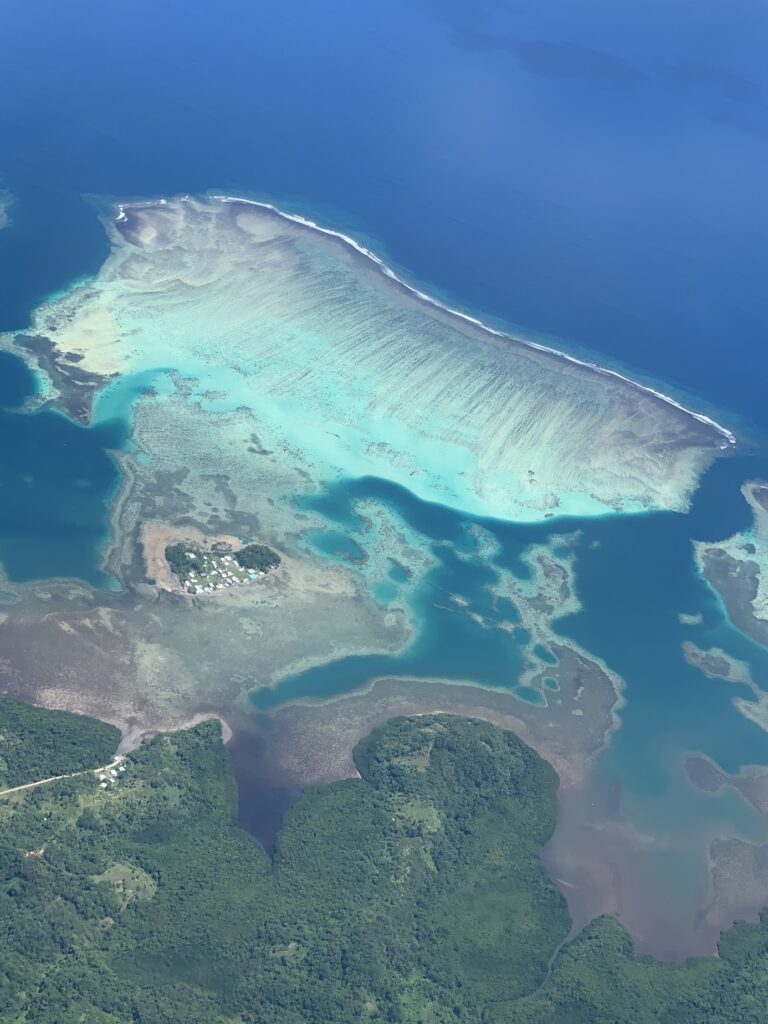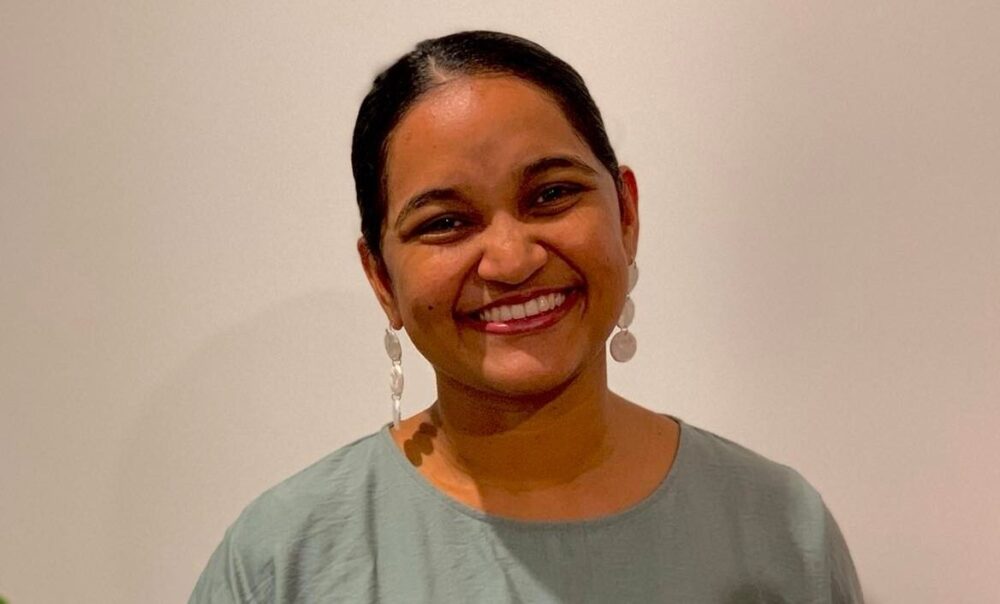A few weeks ago I was reminded of the importance of evidence, narratives and the power held by those writing it at a workshop on Gender & Cultural Diversity in Politics: Australia, Asia & the Pacific. As a young Pacific researcher, there was much reminiscing of the audacity of the ocean as I sat on the lands of Ngambri and Ngunnawal people and reflected upon my positionality within the ecosystem of researchers and storytellers.
As Professor Linda Tuhiwai Smith reveals, “An activist must get the story right as well as tell the story well, and so must a researcher.”
As a non-indigenous Pacific Islander, I chose an intentionally intersectional approach of conducting fieldwork for my research which examines the gendered impacts of climate change-induced planned relocation and displacement through a political economy framework.
Fiji has been a global advocate for the impacts of climate change induced human mobility and has developed numerous national level policies and procedures, including the Planned Relocation and Displacement Guidelines, yet the processes of relocation are political and contested.
Drawing on a study of Fijians residing along the western coast of Viti Levu my forthcoming thesis seeks to analyze who made the decisions, who holds the power, who did the work and who benefited the most during instances of climate-induced human mobility.

An image taken by Betty during her fieldwork in Fiji. It shows islands that are at high risk of climate-induced planned relocation off the main land in Fiji. Picture: Supplied/Betty Barkha
Within the context of my PhD, I found a pragmatic way of putting intersectionality into practice by weaving Pacific research methodologies and feminist research ethic through the following guiding principles:
Sensitivity to context
As a non-indigenous Pacific Islander, I recognized the historical tensions that exist within Fiji’s national context and how conducting research should not contribute to further harm. Having spent most of my life in Fiji, I knew of cultural protocols that needed to be abided by when entering iTaukei villages, who to contact within Indo-Fijian settlements and how to find partners within multi-ethnic settlements affected by sudden and slow-onset impacts of the climate crisis. For example, a research participant emphasized:
“How do you reconcile the fact that you have to move from the land where your ancestors lived and where their bones are now buried? Where your umbilical cord is buried which protects our children, how?” – Key informant (female)
Privacy and confidentiality
Research across Pacific Island Countries while safeguarding participant confidentiality is a challenging task. However, this is a crucial component and was adhered to rigorously through use of pseudonyms during the coding and analysis of data. However, as my research progressed, there was evidence that participants who shared their stories wanted to be known for what they do and say within households and communities. For example, in conversation with some key informants it was known that if directly quoted it could easily be traced back because of how many people work within the thematic area.
Respect
This goes without saying; however, many continue to misinterpret respect in the context of undertaking research. In my research on climate-induced human mobility, this required knowledge of the devasting losses and damages faced by communities, their experiences over the years and their ability to recall the trauma and share with a researcher. As a Pacific researcher, I was also well versed of the unique value and connection of individuals and communities with the ecosystem.
As a feminist researcher I was reminded of being attentive to boundaries, relationships and my own situatedness as a researcher.
Free prior and informed consent
More recently, for anyone that is a fan of rugby league will know of the poorly handled jersey debacle recently. What was meant to be symbolic of diversity and inclusion commitments turned out to be non-consultative.
This resulted in targeted harassment of Pacific Islanders and their beliefs, when in fact it was an issue on free and prior consent. Consent must be voluntary without coercion, intimidation, or manipulation and as a researcher in the field this meant regular communication, knowledge of cultural and social structures and ways to navigate through them.
Free prior and informed consent fosters a relationship that allows participants to take ownership of their engagement and feel confident of their interactions, particularly when speaking to the loss and damages posed by the climate crisis.
Reflexivity and flexibility
Building a Pacific-feminist research design required regular deliberation, where I intentionally interrogated the process, approach and considered the ethical implications of each aspect alongside my supervision team. This is also an opportunity to emphasize the importance of an enabling and supportive supervision team (thank you Monash GPS!) that understands the research direction and is aligned with your reflexive research design process. It is also about creating reflective points and building comradery amongst feminist researchers, which is not only critical in shaping technical quality of the research but also in creating opportunities for transforming ways of working.
Meaningful engagement
As a researcher on climate-induced human mobility, it was easy to get caught in the crowds of researchers flocking through the Pacific to “research.” A key informant once jokingly mentioned that “we should build a wall around communities to keep the researchers out.” Extractive researchers continue to reproduce colonial, neoliberal forms of engagement which often take advantage of welcoming hospitality of Pacific populations, without ever sharing lessons learnt. My research was built around willingness of individuals within affected communities and a reflection of my professional journey for key informants, that emphasized the importance of relationality in undertaking such research. For instance, a research participant highlighted:
“You and I don’t know each other well, but we know of each other over time, and you have to be willing to have a conversation with somebody”- Key informant (female)
Reciprocity
While reciprocity comes naturally to many who grew up and lived most of their lives within Pacific Island countries, it is a concept that needs to be more holistically embedded within research. For my research, the findings are intended to inform ongoing and forthcoming processes of climate change induced planned relocation and displacement in Fiji and ongoing work in developing a Pacific Regional Framework on Climate Mobility. Reciprocity in this context implies a relation of mutuality whereby the research process is non-extractive and does not reinforce imperial forms of knowledge production as critiqued by numerous Pacific scholars.
Intersectionality
At its core, this relates to the quote by Audrey Lorde “There is no thing as a single-issue struggle because we do not live single-issue lives.” Scholars, Anna Kaijser, Annica Kronsell, Maria Tanyag and Jacqui True have also argued, that feminist scholarship contributes to an interdisciplinary analysis of climate change by revealing the multiple overlapping forms of insecurity influencing everyday lives. It is also a critical tool in comprehending the varying levels of agency across diverse populations in instances of climate-induced human mobility. For example, a research participant iterated that:
“Even within the pocket-sized gender non-conforming community in Fiji, it matters where you come from, how much you earn and where you stay… but we don’t all share the same politics.” Key informant (gender non-conforming)
An appreciation of the intersectionality of gender with other social inequalities is crucial for understanding the impacts of climate change (and other crises), therefore, reinforcing the need for an intersectional approach.
As I continue to evolve in my journey as a researcher and storyteller, I strive to remain being intentionally intersectional in contributing to thought leadership and evidence generation efforts. Each research or discovery process is unique and so is its associated methodology, however as the disciplines strive to rethink frameworks and approaches, it also crucial that we seek to be intentionally intersectional in our approach.
Betty is a final year PhD candidate at Monash University, Centre for Gender, Peace and Security (Monash GPS). Betty also serves as an advisor to FRIDA Young Feminist Fund, the Global Resilience Fund, FHI 360 and is currently the Co-Chair of the Board for International Women’s Development Agency (IWDA).





